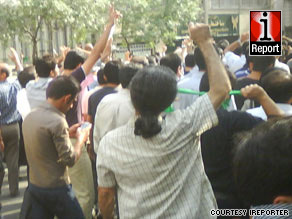
As a tense Tehran awoke Wednesday bracing for more protests, residents in the capital city and elsewhere said they were too afraid to talk about the political crisis over the phone.
Residents, worried the government was monitoring phone conversations, said the Internet was the best way to transmit information about the unrest. However, the spotty connection made it difficult to rely on the Web. “It’s beyond fear,” said a woman who arrived at a U.S. airport from Iran, but still did not want her name used for fear for her safety. “The situation is more like terror.” The difficulty in accessing information has been compounded by a government clampdown on foreign media. Watch how Iran may be spying on residents » International journalists have been banned from covering the protests, prompting media outlets to rely on citizens who are using social networking Web sites to send out videos and photographs depicting scenes of chaos. According to Reporters Without Borders, 36 journalists have been arrested, 26 of them Iranian, since the June 12 presidential election while “many others” are missing. Government-funded Press TV said Wednesday that police have identified a building in central Tehran that was being used as a “headquarters” to foment post-election unrest. The television station, citing unnamed sources, said the building was used by campaign staffers of opposition leader Mir Hossein Moussavi. Evidence indicated that “foreign elements” were behind the planning, Press TV said. The Iranian government has long blamed foreign countries, especially Britain, for “meddling” in its affairs but have not offered up proof. Opposition candidate Mehdi Karroubi strongly scolded Iranian media Tuesday for blaming the recent violence on the demonstrators who took to the streets, claiming the election’s outcome was manipulated. The “assaults, beatings and murder of innocent people” were committed by plain-clothed security forces, not by demonstrators as the Iranian media would like its audiences to believe, Karroubi said in an open letter addressed to the head of state-run radio and television. The letter was posted on Karroubi’s Web site Tuesday. CNN could not confirm the authenticity of the statement because of the restrictions on international journalists inside Iran. All of Iran’s media outlets are controlled by the government. Watch how Iranian TV is covering the crisis » Karroubi, a candidate in the presidential election, and Moussavi have questioned the legitimacy of the vote count and called for the cancellation of the election. On Tuesday, Iran said it was extending the deadline to register ballot fraud complaints to Sunday. Even as the deadline was extended, another candidate, Mohsen Rezaie, withdrew his earlier complaint about voting irregularities and demand for a recount of the ballots.
Don’t Miss
Complete coverage of Iran fallout
Slain woman an unlikely martyr
Obama toughens his talk on Iran
In a letter addressed to the Guardian Council that was posted on Rezaie’s Web site Tuesday, the presidential candidate said he had intended to follow up his accusations. But controlling the political situation inside the country was more important than election results, he said. Again, CNN could not determine the authenticity of the posting. Officials declared incumbent Mahmoud Ahmadinejad the winner of the presidential election by a margin of 2 to 1 over Moussavi to the surprise of many who had expected the challenger to win. Moussavi accused the government of vote-rigging and demonstrators have been protesting the results for more than a week. A message posted on Twitter said more than 10,000 people demonstrated in the eastern city of Tabriz, where Moussavi comes from. Pro-government militias were out on Tehran streets Tuesday, but many drivers turn on their hazard lights as a sign of support for the protests, eyewitnesses told CNN. CNN is not naming them for security reasons. U.S. President Barack Obama said Tuesday that Iran’s government must justify itself not in the eyes of the United States, but in the opinion of its own people. “A sizable percentage of the Iranian people themselves … consider this election illegitimate,” he said at a White House news conference. “It is not too late for the Iranian government to recognize that there is a peaceful path that will lead to stability and prosperity,” he said. “We hope they take it.” Shortly before he spoke, Iranian state-run media reported Ahmadinejad will be sworn in to a second term between July 26 and August 19. Other countries have complained loudly about Tehran’s reaction to the demonstrators. For the second time since the election, France on Tuesday blasted Iran’s “brutal crackdown on the demonstrations,” its foreign ministry announced. Watch as European governments step up criticism » Britain expelled two Iranian diplomats Tuesday after Iran asked two British diplomats to leave a day earlier. Meanwhile, a reporter from the Washington Times in Tehran became the latest journalist to be taken into custody. Iason Athanasiadis, a Greek passport holder, was arrested late last week, the Greek foreign ministry said.
On Sunday, the BBC said Iran had expelled Jon Leyne, its permanent correspondent in Tehran. Also on Sunday, a Canadian-Iranian working for Newsweek magazine in Tehran was “detained without charge” by Iranian authorities, according to the magazine. The Tehran bureau of the Dubai-based Arab satellite station Al-Arabiya was ordered closed, the station said.